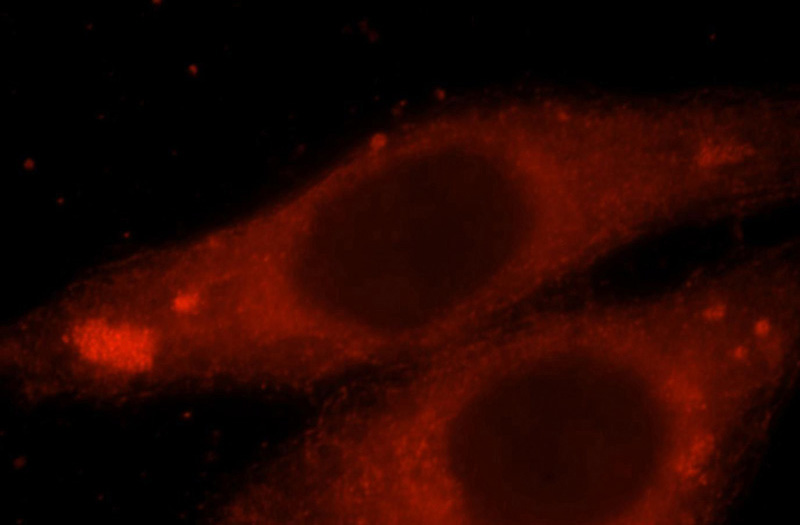-
Product Name
PDE7B antibody
- Documents
-
Description
PDE7B Rabbit Polyclonal antibody. Positive WB detected in HeLa cells, mouse brain tissue. Positive IHC detected in human brain tissue. Positive IF detected in HepG2 cells. Observed molecular weight by Western-blot: 50kd
-
Tested applications
ELISA, WB, IHC, IF
-
Species reactivity
Human,Mouse,Rat; other species not tested.
-
Alternative names
bA472E5.1 antibody; PDE7B antibody; phosphodiesterase 7B antibody
-
Isotype
Rabbit IgG
-
Preparation
This antibody was obtained by immunization of PDE7B recombinant protein (Accession Number: NM_018945). Purification method: Antigen affinity purified.
-
Clonality
Polyclonal
-
Formulation
PBS with 0.02% sodium azide and 50% glycerol pH 7.3.
-
Storage instructions
Store at -20℃. DO NOT ALIQUOT
-
Applications
Recommended Dilution:
WB: 1:500-1:5000
IHC: 1:20-1:200
IF: 1:10-1:100
-
Validations

HeLa cells were subjected to SDS PAGE followed by western blot with Catalog No:113669(PDE7B antibody) at dilution of 1:1000

Immunohistochemical of paraffin-embedded human brain using Catalog No:113669(PDE7B antibody) at dilution of 1:100 (under 10x lens)

Immunohistochemical of paraffin-embedded human brain using Catalog No:113669(PDE7B antibody) at dilution of 1:100 (under 40x lens)

Immunofluorescent analysis of HepG2 cells, using PDE7B antibody Catalog No:113669 at 1:25 dilution and Rhodamine-labeled goat anti-rabbit IgG (red).
-
Background
PDE7B(cAMP-specific 3',5'-cyclic phosphodiesterase 7B) belongs to the cyclic nucleotide phosphodiesterase family and PDE7 subfamily,which regulate intracellular levels of cAMP and cGMP, cyclic nucleotides that play important roles as second messengers in multiple physiologic processes. PDE7B gene is expressed predominantly in the brain and in a number of other tissues including liver, heart, thyroid glands, and skeletal muscle, but not expressed in blood leukocytes (PMID:12388353).
-
References
- Morales-Garcia JA, Aguilar-Morante D, Hernandez-Encinas E. Silencing phosphodiesterase 7B gene by lentiviral-shRNA interference attenuates neurodegeneration and motor deficits in hemiparkinsonian mice. Neurobiology of aging. 36(2):1160-73. 2015.
Related Products / Services
Please note: All products are "FOR RESEARCH USE ONLY AND ARE NOT INTENDED FOR DIAGNOSTIC OR THERAPEUTIC USE"
